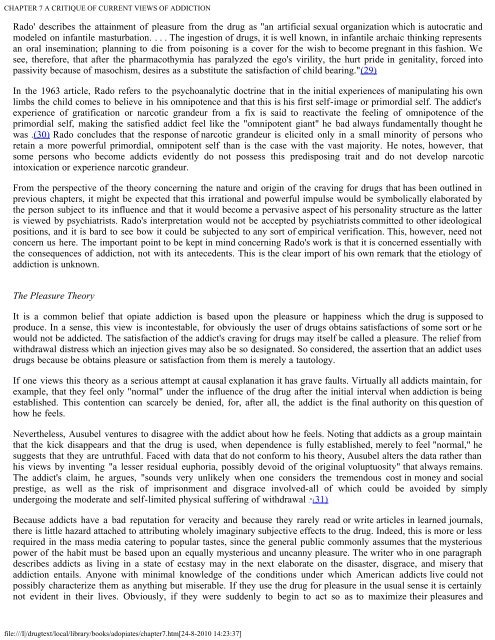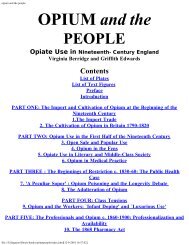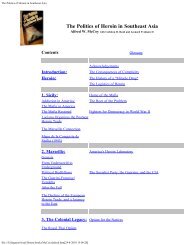Addiction and Opiates
Addiction and Opiates
Addiction and Opiates
You also want an ePaper? Increase the reach of your titles
YUMPU automatically turns print PDFs into web optimized ePapers that Google loves.
CHAPTER 7 A CRITIQUE OF CURRENT VIEWS OF ADDICTION<br />
Rado' describes the attainment of pleasure from the drug as "an artificial sexual organization which is autocratic <strong>and</strong><br />
modeled on infantile masturbation. . . . The ingestion of drugs, it is well known, in infantile archaic thinking represents<br />
an oral insemination; planning to die from poisoning is a cover for the wish to become pregnant in this fashion. We<br />
see, therefore, that after the pharmacothymia has paralyzed the ego's virility, the hurt pride in genitality, forced into<br />
passivity because of masochism, desires as a substitute the satisfaction of child bearing."(29)<br />
In the 1963 article, Rado refers to the psychoanalytic doctrine that in the initial experiences of manipulating his own<br />
limbs the child comes to believe in his omnipotence <strong>and</strong> that this is his first self-image or primordial self. The addict's<br />
experience of gratification or narcotic gr<strong>and</strong>eur from a fix is said to reactivate the feeling of omnipotence of the<br />
primordial self, making the satisfied addict feel like the "omnipotent giant" he bad always fundamentally thought he<br />
was .(30) Rado concludes that the response of narcotic gr<strong>and</strong>eur is elicited only in a small minority of persons who<br />
retain a more powerful primordial, omnipotent self than is the case with the vast majority. He notes, however, that<br />
some persons who become addicts evidently do not possess this predisposing trait <strong>and</strong> do not develop narcotic<br />
intoxication or experience narcotic gr<strong>and</strong>eur.<br />
From the perspective of the theory concerning the nature <strong>and</strong> origin of the craving for drugs that has been outlined in<br />
previous chapters, it might be expected that this irrational <strong>and</strong> powerful impulse would be symbolically elaborated by<br />
the person subject to its influence <strong>and</strong> that it would become a pervasive aspect of his personality structure as the latter<br />
is viewed by psychiatrists. Rado's interpretation would not be accepted by psychiatrists committed to other ideological<br />
positions, <strong>and</strong> it is bard to see bow it could be subjected to any sort of empirical verification. This, however, need not<br />
concern us here. The important point to be kept in mind concerning Rado's work is that it is concerned essentially with<br />
the consequences of addiction, not with its antecedents. This is the clear import of his own remark that the etiology of<br />
addiction is unknown.<br />
The Pleasure Theory<br />
It is a common belief that opiate addiction is based upon the pleasure or happiness which the drug is supposed to<br />
produce. In a sense, this view is incontestable, for obviously the user of drugs obtains satisfactions of some sort or he<br />
would not be addicted. The satisfaction of the addict's craving for drugs may itself be called a pleasure. The relief from<br />
withdrawal distress which an injection gives may also be so designated. So considered, the assertion that an addict uses<br />
drugs because be obtains pleasure or satisfaction from them is merely a tautology.<br />
If one views this theory as a serious attempt at causal explanation it has grave faults. Virtually all addicts maintain, for<br />
example, that they feel only "normal" under the influence of the drug after the initial interval when addiction is being<br />
established. This contention can scarcely be denied, for, after all, the addict is the final authority on this question of<br />
how he feels.<br />
Nevertheless, Ausubel ventures to disagree with the addict about how he feels. Noting that addicts as a group maintain<br />
that the kick disappears <strong>and</strong> that the drug is used, when dependence is fully established, merely to feel "normal," he<br />
suggests that they are untruthful. Faced with data that do not conform to his theory, Ausubel alters the data rather than<br />
his views by inventing "a lesser residual euphoria, possibly devoid of the original voluptuosity" that always remains.<br />
The addict's claim, he argues, "sounds very unlikely when one considers the tremendous cost in money <strong>and</strong> social<br />
prestige, as well as the risk of imprisonment <strong>and</strong> disgrace involved-all of which could be avoided by simply<br />
undergoing the moderate <strong>and</strong> self-limited physical suffering of withdrawal ."(31)<br />
Because addicts have a bad reputation for veracity <strong>and</strong> because they rarely read or write articles in learned journals,<br />
there is little hazard attached to attributing wholely imaginary subjective effects to the drug. Indeed, this is more or less<br />
required in the mass media catering to popular tastes, since the general public commonly assumes that the mysterious<br />
power of the habit must be based upon an equally mysterious <strong>and</strong> uncanny pleasure. The writer who in one paragraph<br />
describes addicts as living in a state of ecstasy may in the next elaborate on the disaster, disgrace, <strong>and</strong> misery that<br />
addiction entails. Anyone with minimal knowledge of the conditions under which American addicts live could not<br />
possibly characterize them as anything but miserable. If they use the drug for pleasure in the usual sense it is certainly<br />
not evident in their lives. Obviously, if they were suddenly to begin to act so as to maximize their pleasures <strong>and</strong><br />
file:///I|/drugtext/local/library/books/adopiates/chapter7.htm[24-8-2010 14:23:37]





